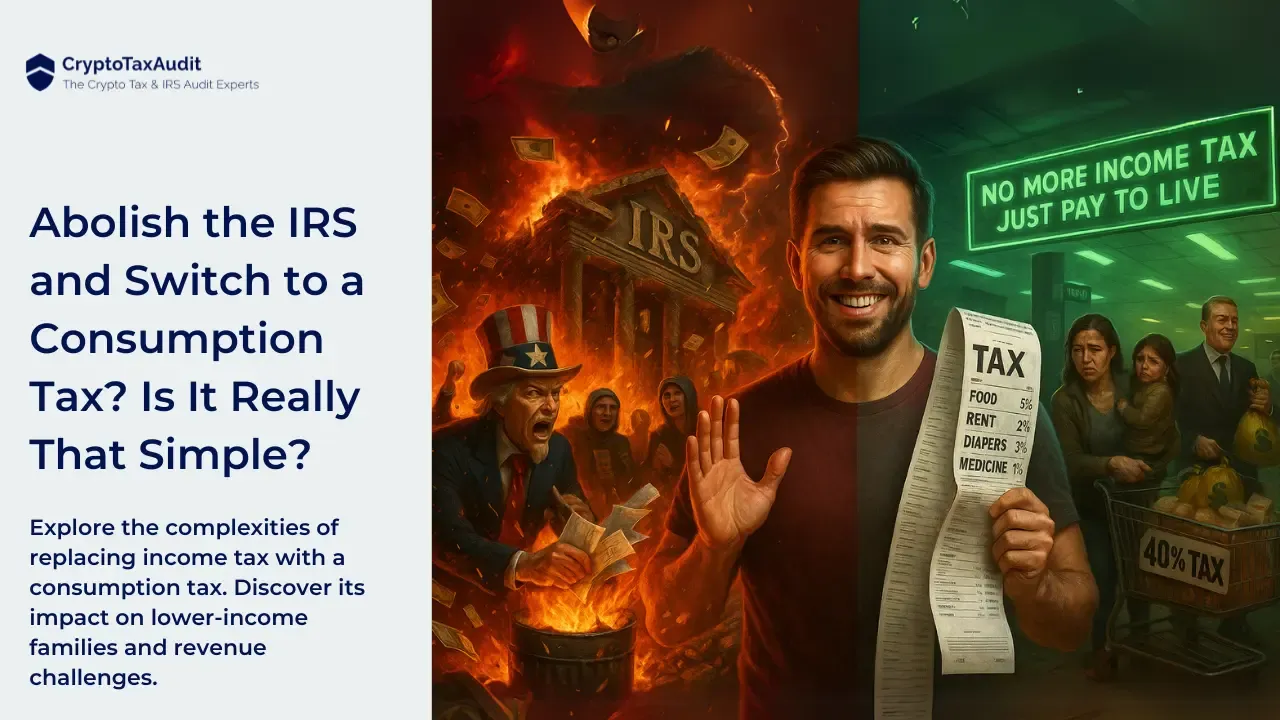
Find out what a wash sale is and why every crypto investor should understand where the IRS stands and how it applies to cryptocurrency trading.
What Is A Wash Sale?
A wash sale occurs when you sell stock in a company and buy stock in the same company within 30 days before or after the sale. If this happens, then you are not allowed to claim a capital loss on the sale.
Why Is The Wash Sale Important To An Investor?
For example, if you bought Apple stock for $20,000. The value drops, and you sell it all at $13,000. You have regrets and repurchase it for $13,000 the next day. Later that year, the price soars to $21,000, at which point you sell for a profit. There were two times when the stock was sold – once for a $7000 loss, the second for an $8000 gain. You had a net profit of $1000.
What is the tax impact?
Because the wash sale rule applies, you are denied the $7000 loss. Your total capital gain will be $8000. The tax would be about $2000. So because of the wash sale rule, you lost $1000. What???
If the wash sale rule had not applied, you would have had a net capital gain of $1000. The taxes would have been about $250, so you would still be in the black.
Does The Wash Sale Rule Apply To Crypto Trading?
The short answer is usually no. Let us discuss how I come up with this recommendation.
With exasperation, people often say that the IRS has no guidance on how crypto transactions are taxed. That is a naïve statement—quite the opposite. The law and regulations provide significant guidance on cryptocurrency taxation.
What Is The Hierarchy Of Legal Authorities?
Have you heard people say, "The IRS says…"?
Everyone is entitled to an opinion, including the IRS.
Whose opinions have more weight?
Lawyers call this the hierarchy of authorities.
The top authority is the U.S. Constitution, which gives power to Congress to enact tax laws. The tax laws go by different names. Formally it is Title 26 of the U.S. Code (USC) or often called the Internal Revenue Code(IRC) or Code for short.
After-tax laws are written, the U.S. Treasury and the IRS propose regulations to clarify how the law is to be interpreted. These regulations are offered for public comment before being formally approved. Regulations are binding on the IRS. The regulations are called officially Title 26 Code of Federal Regulations (CFR), also called IRS Regulations or (Reg. for short).
Surprisingly, the next level is legislative history, which is the past laws, including the formal minutes or notes from the Joint Committee on Taxation (JCT). These notes often explain what the lawmakers were concerned about when they pass tax laws. This helps to interpret what the laws mean.
Judicial authority is the next level of authority. There is a hierarchy of courts. The top court for tax laws is the U.S. Supreme Court, followed by the U.S. Circuit Court of Appeals, U.S. District Court, U.S. Tax Court, U.S. Court of Federal Claims.
Next come several levels of IRS positions.
- Revenue Rulings are the IRS official interpretation of the Code and Regs. Revenue Rulings can be relied upon and cited as authority.
- Revenue Procedures are official IRS interpretations on complying with the tax law and can be relied upon and cited as authority.
- Private Letter Rulings, Determination Letters, Technical Advice Memoranda, Chief Counsel Advice, and Notices are all forms of IRS guidance on a specific taxpayer's situation and cannot be relied upon by other taxpayers; however, they can provide insight on the IRS position on certain issues and may lead to a primary source that may not have been previously considered.
- IRS Announcements, Forms, Publications, and FAQs provide guidance only and should not be solely relied upon.
- Everything else, including IRS staff's opinions, is unofficial and should not be cited as authority.
- The next time someone tells you, "The IRS says…", ask how did the IRS say that. For more on this topic, see: https://www.irs.gov/newsroom/understanding-irs-guidance-a-brief-primer.
As we think about the taxation of cryptocurrencies, we must consider the hierarchy of authorities.
What Does The Law Say About Wash Sales For Cryptocurrencies?
Always start at the top. What does the law say?
Try this. Type "IRC 1091" into your browser search.
In IRC 1091, we have the wash sale rule in paragraph (a). The subsequent paragraphs address the complexities this law creates. Here is the first paragraph of IRC 1091(a). Law can be hard to understand. The first sentence has 122 words!
"(a)Disallowance Of Loss Deduction
In the case of any loss claimed to have been sustained from any sale or other disposition of shares of stock or securities where it appears that, within a period beginning 30 days before the date of such sale or disposition and ending 30 days after such date, the taxpayer has acquired (by purchase or by an exchange on which the entire amount of gain or loss was recognized by law), or has entered into a contract or option so to acquire, substantially identical stock or securities, then no deduction shall be allowed under section 165 unless the taxpayer is a dealer in stock or securities and the loss is sustained in a transaction made in the ordinary course of such business. For purposes of this section, the term "stock or securities" shall, except as provided in regulations, include contracts or options to acquire or sell stock or securities." [1]
This law doesn't mention cryptocurrencies by name. It only applies to "stocks or securities."
Definitions are vital in reading law.
My question is, how is the phrase "stocks and securities" defined?
Would the definition include cryptocurrencies?
What Do The Regulations Say?
The IRS Regulations closely parallel the law, with similar numbering. Here is what the regulation says in IRS Regulation 1.1091-1(a):
"(a) A taxpayer cannot deduct any loss claimed to have been sustained from the sale or other disposition of stock or securities if, within a period beginning, 30 days before the date of such sale or disposition and ending 30 days after such date (referred to in this section as the 61-day period), he has acquired (by purchase or by an exchange upon which the entire amount of gain or loss was recognized by law), or has entered into a contract or option so to acquire, substantially identical stock or securities. However, this prohibition does not apply (1) in the case of a taxpayer, not a corporation, if the sale or other disposition of stock or securities is made in connection with the taxpayer's trade or business, or (2) in the case of a corporation, a dealer in stock or securities if the sale or other disposition of stock or securities is made in the ordinary course of its business as such dealer." [2]
This regulation repeats the phrase "stock or securities" without offering a definition.
What Does "Stocks and Securities" Mean?
We have to go back a couple of sections in the Regulations to 1.1083-1.
(f) Stock Or Securities.
The term stock or securities is defined in section 1083(f) for the purposes of part VI (section 1081 and following), subchapter O, chapter 1 of the Code. As therein defined, the term includes voting trust certificates and stock rights or warrants. [3]
Well, we are getting close. We are told to go to section 1083(f). This is a section in the law. This tells us that the definition only applies to part VI, subchapter O, Chapter 1 of the Tax Code. This would apply to section 1091 Wash Sale Rule.
When we look up section 1083, we find a message which says that sections 1081 to 1083 were repealed in 2005.
Repealed means it was removed from the law. So the regulation points to code section 1083 that no longer exists.
Whoops!
Now what? We can still look at the repealed law to understand the legislative history. Remember that legislative history is significant in the hierarchy of authorities. It may be gone, but not forgotten. The old section 1083(f) read:
"(f) Stock Or Securities
For purposes of this part, the term "stock or securities" means shares of stock in any corporation, certificates of stock or interest in any corporation, notes, bonds, debentures, and evidences of indebtedness (including any evidence of an interest in or right to subscribe to or purchases any of the foregoing)." [4]
Finally, "stock or securities" is defined.
Notice that the phrase is defined in terms of shares of stock in a corporation and other securities related to the indebtedness of a corporation.
We could also consult other court cases as another authority to help us. We would find that past court cases interpreted "stocks or securities" in terms of corporations.
Are Cryptocurrencies Shares Of Stock Or Evidence Of Indebtedness?
If the answer is no, then the wash sale rule does not apply to cryptocurrencies.
There are some new tokens coming out that represent ownership of stock of a corporation. The wash sale rule would apply to these.
The SEC has suggested that some cryptocurrencies, like ICOs, should be treated as securities, but this is under securities law different from the tax laws.
There is potential that governance tokens might be considered "shares of stock" if a distributed autonomous organization could be classified as a corporation.
Will I Get Audited If I Ignore The Wash Sale Rule On Crypto Tax Reporting?
The IRS would have difficulty detecting this by data mining. Audits occur because of targeted compliance campaigns where the IRS goes after specific types of non-compliance.
As shown above, we have a reasonable basis for our opinion. An auditor may disagree. That's fine. It is up to the Appeals office or, ultimately, the courts to determine the answer.
We recommend including with the tax return Form 8275 to disclose that "The Taxpayer holds that Code 1091 does not apply to the taxation of cryptocurrencies." The purpose of this disclosure is to avoid a 20-40% accuracy penalty if an auditor disagrees with you according to code section 6662(d)(2).
If you are concerned about getting audited, consider an audit early warning service like cryptotaxaudit.com. They monitor your IRS returns and let you know if a campaign has flagged a return for audit.
[1] Tax Code 1091(a)
[2] IRS Reg. 1.1091-1(a)
[3] IRS Reg. 1.1083(1)(f)
[4] Tax Code 1083(f) * sections 1081 through 1083 were repealed in 2005.




